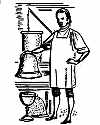|
When the
American Revolution came along, Paul Revere found the
Colonial Army in great need of gunpowder and cannon, not silver
tankards and teapots - so he immediately turned his abilities to the
war effort.
Revere naturally had a good knowledge of metals - today we call it "know-how." Special knowledge and skill are always valuable assets in any emergency. So the Government asked him to build two gunpowder mills and later he also cast cannon from iron and brass for the American Army. Paul Revere and Eli Whitney were the two men who first brought to the attention of the World the fact that industry is very versatile - a most valuable National asset in both War and Peace.  After the War was over Revere returned to his trade of
silver-smithing. However, out of his experience in the war work had
grown a desire to continue experimenting with alloys, heat-treating and
casting metals.
After the War was over Revere returned to his trade of
silver-smithing. However, out of his experience in the war work had
grown a desire to continue experimenting with alloys, heat-treating and
casting metals. So in 1788 he established a foundry in North Boston. This plant had the first smoke-stack in the city. And out of this foundry came all kinds of things - household hardware, anvils, hammers, spikes, cogs and even 400 bells! These were some of the tools used in the building of America! |








